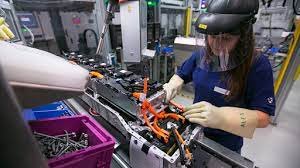Battery System Assembly Operator

In the realm of modern technology, battery systems play a pivotal role in powering various devices, from smartphones to electric vehicles. Behind the scenes of these advanced power sources lies a crucial figure: the Battery System Assembly Operator. This article delves into the responsibilities, skills, and importance of this role within the burgeoning field of battery technology.
Introduction to Battery System Assembly
Battery systems are complex assemblies comprising various components such as cells, modules, and management systems. These systems are designed to store and deliver electrical energy efficiently and reliably. The process of assembling these intricate systems requires precision, attention to detail, and adherence to strict quality standards. This is where the Battery System Assembly Operator comes into play.
Role and Responsibilities
The Battery System Assembly Operator is responsible for the assembly, testing, and quality assurance of battery systems. Their primary duties include:
- Component Inspection and Preparation: Operators inspect incoming components such as battery cells, connectors, and casing materials to ensure they meet specifications. They also prepare these components for assembly, which may involve cleaning, sorting, and organizing.
- Assembly Process: The operator follows assembly instructions and schematics to assemble the battery system. This includes arranging cells in the desired configuration, connecting them using appropriate methods such as welding or soldering, and integrating control and monitoring systems.
- Testing and Quality Control: Once assembled, the battery system undergoes rigorous testing to verify performance and safety. Operators conduct functional tests, measure key parameters such as voltage and temperature, and inspect for any defects or irregularities.
- Troubleshooting and Maintenance: In the event of issues or failures during assembly or testing, operators troubleshoot the problem, identify root causes, and implement corrective actions. They also perform routine maintenance tasks to ensure equipment and tools remain in optimal condition.
- Documentation and Reporting: Operators maintain detailed records of assembly processes, test results, and any deviations from standards. They may also generate reports summarizing production metrics, quality metrics, and any incidents or issues encountered.
Skills and Qualifications
To excel as a Battery System Assembly Operator, individuals require a blend of technical skills, practical experience, and personal qualities:
- Technical Competence: A solid understanding of electrical systems, mechanical assembly techniques, and safety protocols is essential. Knowledge of battery chemistry, electronics, and manufacturing processes is also beneficial.
- Attention to Detail: Given the precision required in assembly and testing, operators must have keen attention to detail to ensure components are correctly aligned, connections are secure, and quality standards are upheld.
- Problem-Solving Abilities: The ability to troubleshoot issues, identify root causes, and implement effective solutions is critical. Operators must be able to think analytically and adapt to changing circumstances.
- Manual Dexterity: Working with small components and intricate assemblies demands good hand-eye coordination and manual dexterity. Operators must be comfortable using hand tools, power tools, and specialized equipment.
- Teamwork and Communication: Battery assembly often involves collaboration with engineers, technicians, and other operators. Strong communication skills and the ability to work effectively as part of a team are therefore essential.
- Adherence to Safety Protocols: Working with electrical systems and potentially hazardous materials requires strict adherence to safety procedures to prevent accidents or injuries.
Importance in Battery Technology
The role of the Battery System Assembly Operator is pivotal in ensuring the reliability, performance, and safety of battery systems. These systems are integral to a wide range of applications, including consumer electronics, renewable energy storage, and electric vehicles. By meticulously assembling and testing battery systems, operators contribute to:
- Quality Assurance: By adhering to strict assembly standards and conducting thorough testing, operators help ensure that battery systems meet performance specifications and safety regulations.
- Reliability: Well-assembled battery systems are more reliable and less prone to failures or malfunctions, which is crucial in applications where downtime or disruptions are costly or inconvenient.
- Safety: Proper assembly techniques and quality control measures mitigate the risk of safety hazards such as short circuits, overheating, or leakage of hazardous materials.
- Innovation: As battery technology continues to evolve, assembly operators play a role in implementing new manufacturing processes, materials, and design innovations that enhance performance and efficiency.
Conclusion

In the fast-paced world of battery technology, the Battery System Assembly Operator is a linchpin in the production process. Their expertise, attention to detail, and commitment to quality are instrumental in ensuring that battery systems meet the demands of modern applications. As the demand for energy storage solutions grows and technology advances, the role of the assembly operator will remain essential in driving innovation and enabling the widespread adoption of battery technology.
